The Untold Story Behind The Lucrative Footwear Brand Nicknamed The “Nike Of Africa”
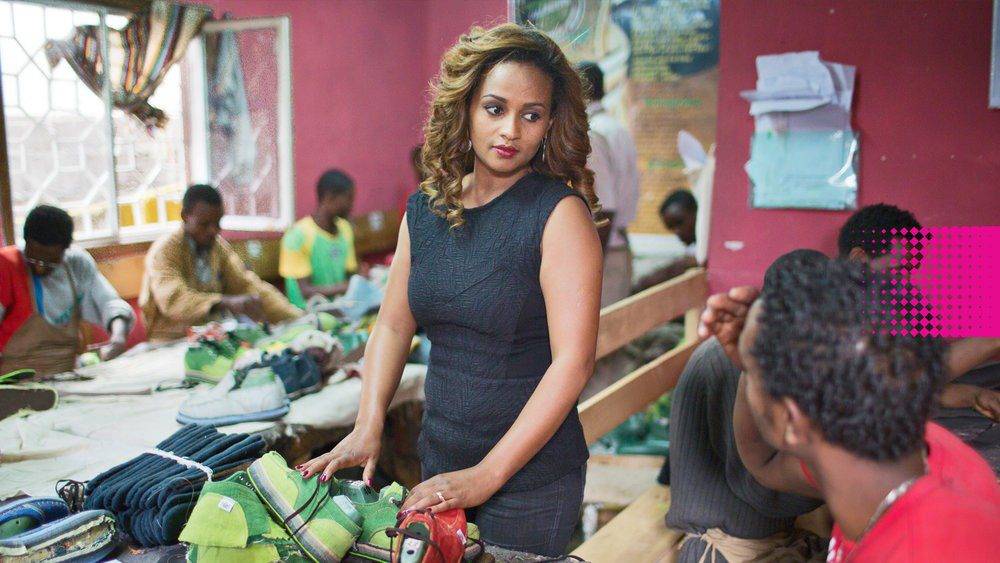
There are those who find success by taking advantage of opportunities and meeting needs. And there are those who just have it come to them naturally by helping people. The latter is more like the case for a certain entrepreneur from Ethiopia.
Many different routes could be taken on the path to accomplishing one’s life goals and while many have been able to score those points, only a few have found true happiness and personal fulfillment while at it.
Bethlehem Tilahum Alemu might be as close to “one of those few persons” as one can get. The Ethiopian entrepreneur set up a venture to offer help to the poor in her community. The idea was to offer respite to the impoverished of society, but somehow it bore her a business now worth millions of dollars.
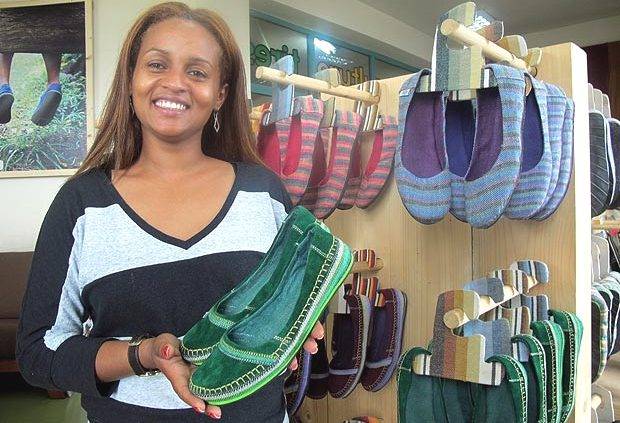
Source: afjn.org
Today, her company; soleRebels, is not only one of the leading shoe brands in Africa, but also a force to reckon with beyond the continent as its products are sold in as many as 22 stores spread across the globe, having found markets in places like the United States, Singapore, Greece, Spain, Singapore, Switzerland, and Austria, among others.
Bethlehem Alemu grew up in Zenabwork; a small, impoverished rural community in Addis-Ababa, Ethiopia. As a child born and raised in those surroundings, she witnessed first hand the abject squalor and privations that characterised life in the area. Food rations were lean, funds were leaner.
Bethlehem’s parents made a modest living by working at a local hospital. They weren’t really raking in much from their respective jobs but by the community’s standards, they were pretty much well off.
And maybe they were, especially as Bethlehem was able to not only complete her primary and secondary education but also college. She subsequently obtained a degree in Accounting from Unity University in 2004.
While growing up, she observed that while most of the locals were unemployed and their living standards consequently low, several of them could summon impressive artisan skills.
To her, skills like that ought to count for something. Even before she went off to college, she had thought about ways through which those artisans could benefit substantially from their skill.
Bethlehem soon began to see the big picture and it worried her that her homeland was awash with what could be called “charity brands” while being unable to boast of a single global brand of its own.
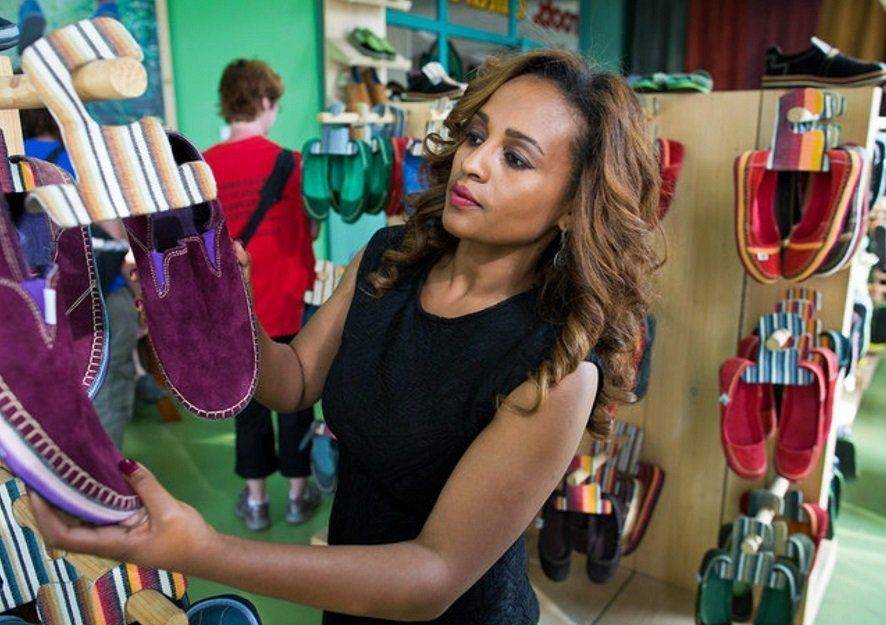
“I was born here in Ethiopia and I grew up here so I saw the state of people — the way they lived and the way they worked, and I felt if I had a company (it) should pay a certain amount of money, so the employees can take care of themselves and their families,” she once told CNN.
These observations fuelled her drive to tinker with ways through which she could transform the skills of the people in her community into a sustainable enterprise that could generate livelihoods for them, and create wealth over the long term.
Once she graduated from college in 2004, Bethlehem was raring to go. She had a good idea of what she wanted and where she wanted to be, but first, she had to make a detour — one that had something to do with working in the private sector for a while.
But soon she was ready to tap into the rich artisan wealth and heritage of her community in particular and country in general. By 2005, Bethlehem had come up with a plan; she was going to reimagine and reinvent footwear in Ethiopia and those artisans were going to be pivotal — only that this time, they were going to adequately rewarded for their efforts.
Having a plan was never going to be enough, though. There was the matter of funding. But she got through that by combing all she could from her pockets, as well as her family’s and friends’. Those efforts yielded enough money to, at least, get things started and she did get things up and running, but not before developing a plot of land that had been bequeathed to her by her grandmother. This was to be the worksite of the new venture.
And just like that, the business had been born. She set out with the concept of employing the locals in her community to create ecologically and economically sustainable jobs. Some of these poor locals whom she hired were leprosy survivors, and she paid them up to four and five times the country’s minimum wage.
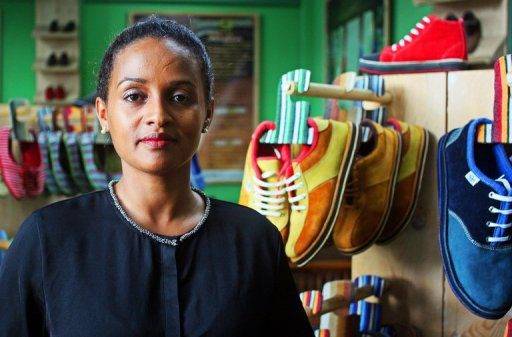
That small workshop has since grown to become a footwear brand named soleRebels — a name that draws some meaning from the fact that Ethiopians were one of the first people to gain independence having fought to resist the clutches of colonialism.
To make the footwears, Bethlehem conceived the idea of repurposing old tires for the fabrication of the soles of the sandals and shoes. That way, she’s not only helping the locals to be self-sufficient but also contributing her quota towards ridding the environment of the unmitigated waste.
Bethlehem’s soleRebels produces handcrafted footwear that often features a strong infusion of ancient Ethiopian culture with subtle undertones of modern, western design influences.
By craft, all soleRebels shoes are redesigns and reimaginations of the famous Selate and Barabasso shoe; a traditional recycled tire sole shoe which has been worn by Ethiopians for a very long time. The Selate and Barabasso shoes were famously worn by Ethiopian rebel fighters who vehemently opposed western forces from colonizing the country; ergo the name of the brand.

soleRebels shoes are essentially a blend of this ancient recycling tradition and contemporary, Western-influenced, hip shoe designs. The company has built a successful footwear brand by utilizing a production process that yields zero carbon emissions; a reasonably eco-friendly system.
Over a period spanning more than a decade, soleRebels has grown from a business with just about 5 employees to a venture that employs well over 120 people. The shoes are distributed to over 30 countries, with the likes of Amazon, Endless, Javari, and Urban Outfitters selling the soleRebels brand.
The business also boasts a number of franchises along with the company’s owned stores operating in countries like Japan, Spain, Taiwan, Austria, Spain, Greece, The United Kingdom, Switzerland, and a couple of others, with a combined store number of at least 22 in operation worldwide.
In 2014, Bethlehem announced a new business called “The Republic Of Leather”, which focuses on high-quality luxury leather goods that are also made from recycled materials recovered from the environment.
Bethlehem Tilahun Alemu has won numerous laurels and accolades. She was recognized as a Young Global Leader by the World Economic Forum in the year 2011, a “Woman to Watch” by Forbes in the year 2012, one of Africa’s Top 5 Female Entrepreneurs by Business Insider in the year 2012, a New York City Venture Fellow by Bloomberg in the year 2012, and one of the “100 Dynamic Women” shaping modern Africa by Arise Magazine in the year 2012.
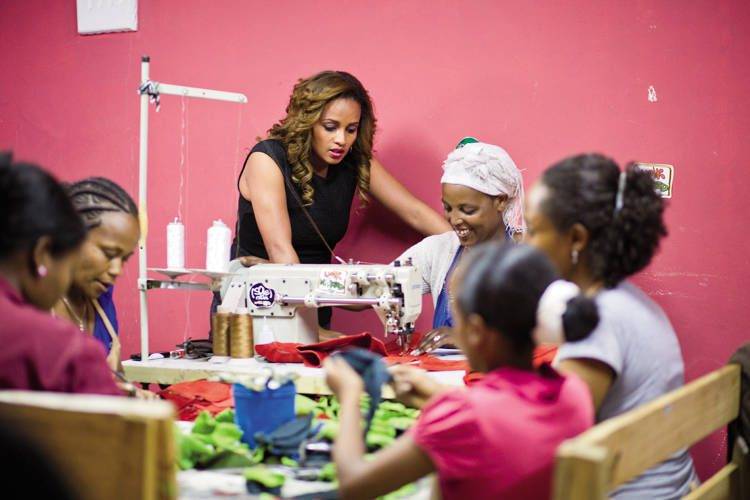
In 2014, CNN named her as one of the “12 Female Entrepreneurs Who Changed the Way We Do Business.” And there’s been many more glowing moments on both the local and international scene.
In 2015, soleRebels was recognised as the first African brand to become an international job creation powerhouse with its international stores forecasted to create over 600 jobs across all the countries where they are located — proof that growth in Africa almost always translates to real global economic and employment growth around the globe.
As per available information, the business currently ships out over 70,000 shoes yearly and is on track to open 100 stores across the globe and hit USD 100 million in revenues in the next few years. Some are already calling soleRebels the “Nike of Africa.”
Not one to rest on her laurels, Bethlehem Alemu is not letting up on her dream of building an international footwear brand right from the heart of Ethiopia despite the points already scored. And based on the evidence on show, it sure looks like she’s making significant headway on that quest.
Featured Image Courtesy: The Exchange